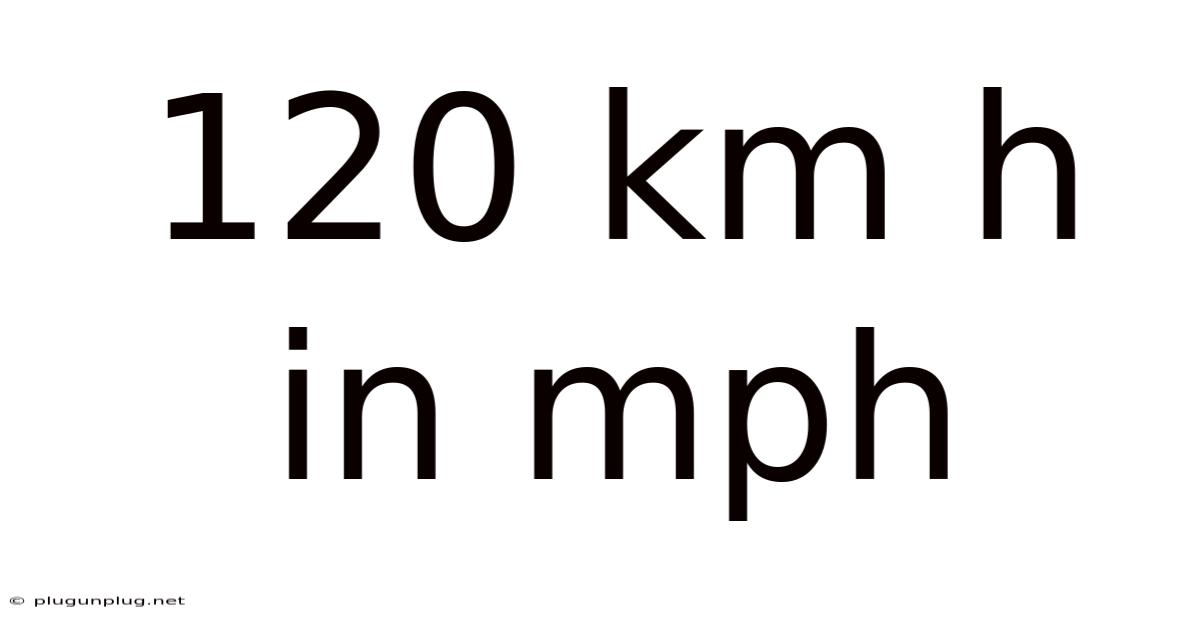120 Km H In Mph
plugunplug
Sep 23, 2025 · 4 min read

Table of Contents
Converting 120 km/h to mph: A Deep Dive into Speed Conversion and its Applications
Knowing how to convert units of measurement is a fundamental skill, particularly in a globalized world where different systems coexist. This article focuses on a common conversion: 120 kilometers per hour (km/h) to miles per hour (mph). We'll not only provide the answer but also delve into the underlying mathematics, explore practical applications of this conversion, and address some frequently asked questions. This comprehensive guide will equip you with a solid understanding of speed conversion and its importance.
Understanding the Units: km/h and mph
Before diving into the conversion, let's understand the units involved. Kilometers per hour (km/h) is a metric unit of speed, representing the distance traveled in kilometers within one hour. Miles per hour (mph) is an imperial unit of speed, representing the distance traveled in miles within one hour. The difference lies in the fundamental units of distance: kilometers and miles. One kilometer is approximately 0.621371 miles. This difference is the key to performing the conversion.
The Conversion: 120 km/h to mph
The most straightforward way to convert 120 km/h to mph is using the conversion factor: 1 kilometer ≈ 0.621371 miles. Therefore:
120 km/h * 0.621371 miles/km ≈ 74.56452 mph
Therefore, 120 km/h is approximately equal to 74.56 mph. We often round this to 74.6 mph for practical purposes.
Detailed Calculation and Explanation
Let's break down the conversion step-by-step to solidify understanding:
-
Identify the conversion factor: The crucial element is the conversion factor between kilometers and miles: 1 km ≈ 0.621371 miles.
-
Set up the equation: We want to convert 120 km/h to mph. We can set up the equation as follows:
x mph = 120 km/h * (0.621371 miles/km) -
Perform the calculation: Multiply 120 by 0.621371:
x mph ≈ 74.56452 mph -
Round the result: Depending on the level of precision required, we can round the result. For most practical purposes, rounding to one decimal place (74.6 mph) is sufficient.
Practical Applications of Speed Conversion
The ability to convert between km/h and mph is crucial in various situations:
-
International Travel: Many countries use the metric system (km/h), while others use the imperial system (mph). Understanding the conversion is essential for interpreting speed limits, navigating, and understanding vehicle specifications while traveling internationally.
-
Automotive Industry: Car manufacturers often provide specifications in both km/h and mph to cater to a global audience. Converting speeds is necessary for comparing vehicle performance across different regions.
-
Aviation: In aviation, speed is often expressed in knots (nautical miles per hour), but conversions to km/h and mph are frequently required for various calculations and communication purposes.
-
Sports: In sports like motor racing and cycling, speeds are often reported in both km/h and mph, depending on the context and the audience. Conversion helps in comparing performance across different races or events.
-
Weather Forecasting: Wind speeds are sometimes reported in both km/h and mph, allowing for better understanding and comparison across different weather reporting systems.
-
Scientific Research: In fields like physics and engineering, converting units is fundamental for ensuring consistency and accuracy in calculations and analysis.
Beyond the Basic Conversion: Understanding Dimensional Analysis
The conversion we performed is a simple application of dimensional analysis. Dimensional analysis is a powerful tool in physics and engineering that involves tracking units throughout calculations to ensure that the final result has the correct units. In our case, we ensured that the kilometers canceled out, leaving us with miles per hour. This method helps prevent errors in calculations involving unit conversions.
Frequently Asked Questions (FAQ)
-
Q: Why is the conversion factor not exactly 0.621371?
- A: The conversion factor is an approximation. The exact conversion is a slightly more complex irrational number. 0.621371 is a sufficiently accurate approximation for most practical applications.
-
Q: Are there other methods to convert km/h to mph?
- A: Yes, you could use online converters or calculators. However, understanding the underlying principles and performing the calculation manually is crucial for a deeper understanding.
-
Q: How do I convert mph to km/h?
- A: To convert mph to km/h, you would use the inverse of the conversion factor: 1 mile ≈ 1.60934 km. Simply multiply the speed in mph by this factor.
-
Q: Is it always necessary to be precise to several decimal places?
- A: No, the level of precision required depends on the context. For everyday applications, rounding to one or two decimal places is usually sufficient. In scientific or engineering contexts, higher precision might be necessary.
Conclusion: Mastering Speed Conversions
Converting 120 km/h to mph is more than just a simple calculation; it's a gateway to understanding unit conversions and their importance across various disciplines. This article provided a comprehensive guide, not only providing the answer (approximately 74.6 mph) but also explaining the underlying mathematics, exploring practical applications, and addressing common questions. Mastering this fundamental skill will enhance your understanding of speed and its measurement, regardless of the unit system used. By understanding the principles of dimensional analysis and the conversion factor, you can confidently tackle similar unit conversions in the future. Remember, the key is not just the answer but the understanding of the process and its real-world applications.
Latest Posts
Latest Posts
-
Animal Starting With Letter U
Sep 23, 2025
-
68 Degree Fahrenheit To Celsius
Sep 23, 2025
-
Dimensions Of A Quarter Coin
Sep 23, 2025
-
Example Of Straw Person Fallacy
Sep 23, 2025
-
How Many Vertices Of Cylinder
Sep 23, 2025
Related Post
Thank you for visiting our website which covers about 120 Km H In Mph . We hope the information provided has been useful to you. Feel free to contact us if you have any questions or need further assistance. See you next time and don't miss to bookmark.